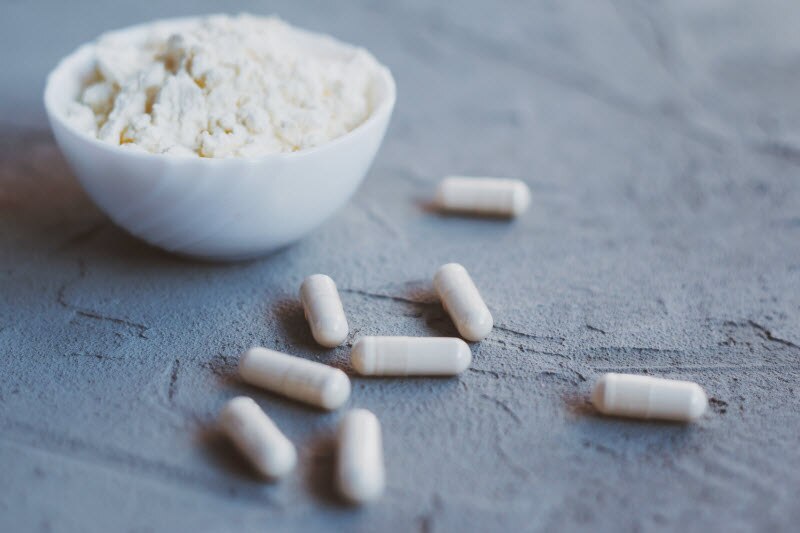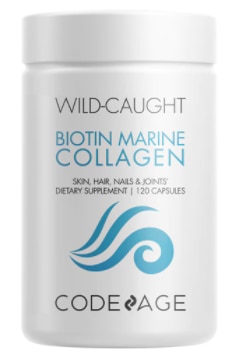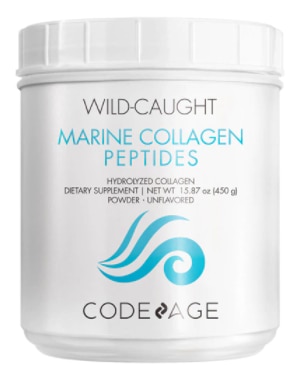Marine collagen is growing in popularity among supplement users – and for good reason! Research continues to reveal the benefits of supplementing with marine collagen peptides to support skin, gut health and tissues such as bones, joints and teeth.†
When considering a collagen supplement, marine collagen is an excellent choice. Here are some of the best reasons to add marine collagen to your nutraceutical collection.
What are some marine collagen benefits?
It’s a sustainable option.
Marine collagen is a sustainable product that helps reduce food production waste. Approximately 70 percent or more of fish weight is thrown away, including the skins, bones, fins, guts, heads and scales. Collagen is obtained from these byproducts, limiting the waste of seafood production.
When looking for marine collagen, choosing one such that also sources their collagen from certified sustainably caught, certified non-GMO, and certified organic compliant operations will help ensure a more earth-friendly option.
As well, look for additional testing for heavy metals in your marine collagen peptides. Some collagen products can contain heavy metals including arsenic, chromium, lead, cadmium, and mercury. These heavy metals are dangerous and can lead to adverse health concerns if consumed regularly. The Clean Label Project has collected data on collagen supplements and has shown many contain heavy metals in measurable amounts. For this reason, look for a marine collagen product that tests for these heavy metals, such as Codeage Marine Collagen Peptides.
It may be more bioavailable.†
Marine collagen may be more bioavailable than other collagen options, meaning your body can assimilate and use the collagen more readily. Hydrolyzed marine collagen peptides are smaller than other types and so may be more easily absorbed and transported through the body.†
It supports healthy skin.†
While all collagen peptides are taken for their benefits for skin, hair, joints, and bones, marine collagen might offer superior results for aging skin. Double-blind placebo-controlled research revealed marine collagen had the ability to reduce wrinkles by 35 percent and 20 percent improvement in skin elasticity with additional improvements in skin firmness, radiance and hydration.†
Skin is composed of 95 percent collagen, which works synergistically with elastin to form skin structure. With aging, collagen production decreases along with skin elasticity. Most of the skin’s appearance is dependent on what goes on in the deepest layers of your skin, which are not influenced by creams and lotions that only reach the top layers. Nutrition (and nutraceuticals) can support these structures and work to improve your skin from the inside out.†
It provides an alternative to bovine and porcine collagen.
Marine collagen provides a meat-free option for those opposed to bovine and porcine sources of collagen. Some religious individuals may need to avoid other mammal-based sources of collagen peptides. Marine collagen is an excellent alternative.
Also, since marine collagen is derived from otherwise wasted fish weight, there is no additional animal farming or culling required to produce, which may appeal to many people concerned with the ethical farming of animals.
It’s an abundant source of important amino acids.
Marine collagen peptides provide 18 essential and non-essential amino acids that support health, including alanine, arginine, glutamic acid, glycine, leucine, lysine, tyrosine, hydroxyproline, proline and valine, among others.
Glycine is known to increase natural collagen synthesis, meaning it supports your ability to produce collagen. Leucine is a powerful amino acid that aids in protein synthesis, making it ideal for repairing tissues, including muscle. It also helps with blood sugar regulation. Proline and hydroxyproline are especially abundant in collagen in particular. These amino acids assist in protein synthesis, metabolism, wound healing and immune response. Proline is needed in high amounts, the most of any amino acid.†
Marine collagen vs. bovine or porcine collagen
What type of collagen peptides you choose to supplement with depends on personal preference and goals. Marine collagen peptides are environmentally sound, ethical, religion and pescatarian friendly, and a highly effective choice. Other types of collagen are still effective and valuable supplements and may be more budget-friendly.
Marine collagen may be beneficial for those hoping to improve the appearance of their skin, including wrinkle reduction, reduced signs of aging and superior skin moisture.† If you have dry or aging skin, marine collagen is an excellent choice.†
†These statements have not been approved by the Food and Drug Administration. These products are not intended to diagnose, treat, cure or prevent disease.



